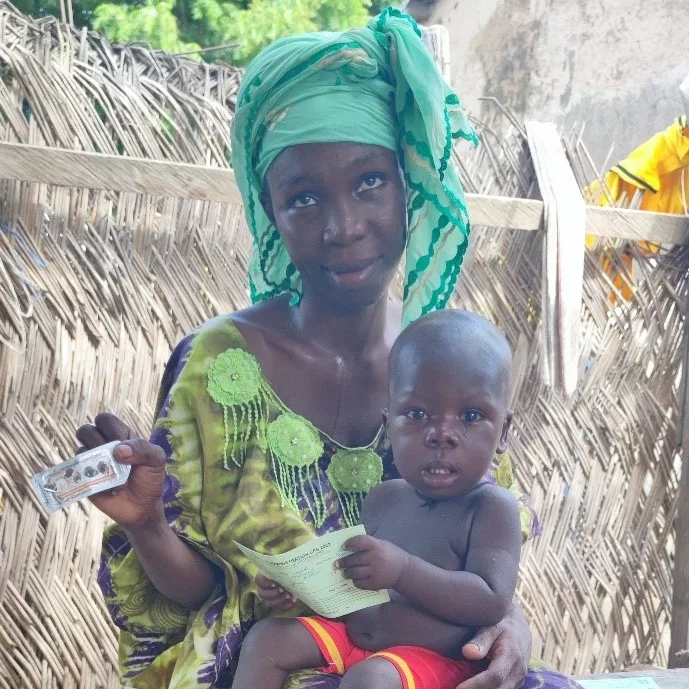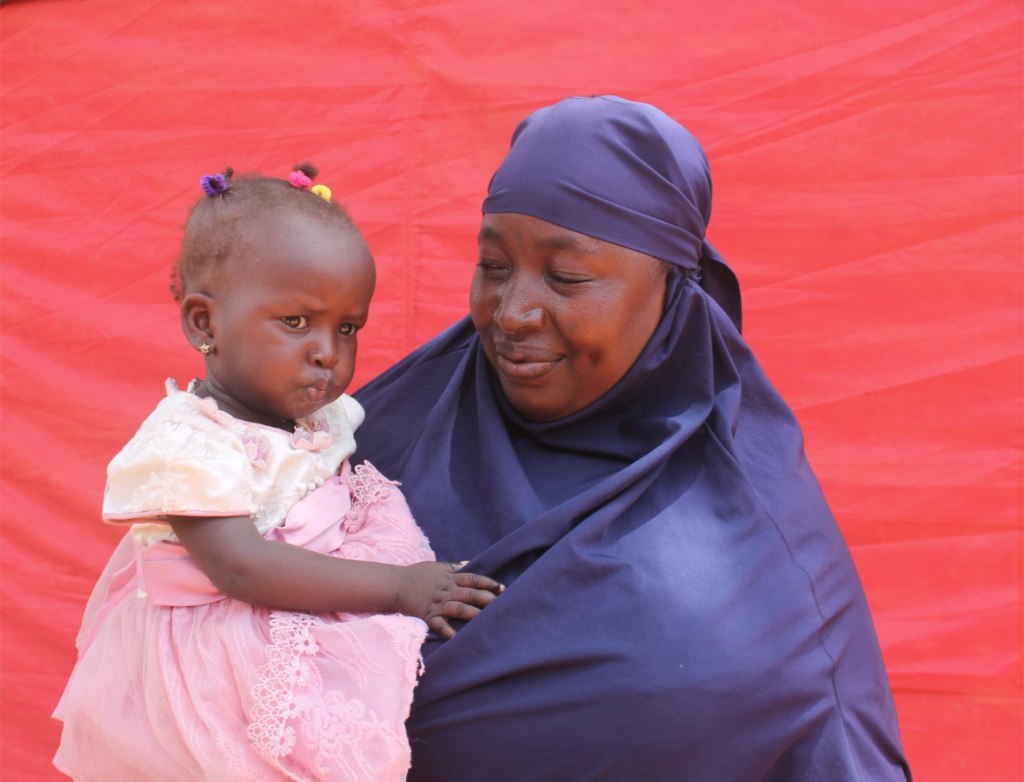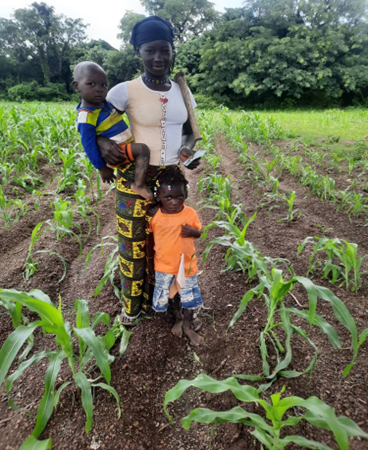This piece originally ran on impactmalaria.org
“The importance of seasonal malaria chemoprevention (SMC) for our communities is undeniable,” remarked Daniel Otu, District Supervisor of the Mokolo Health District in Northern Cameroon. Daniel is one of seven district supervisors in Mokolo who coordinate the delivery of antimalarial medicine through community mobilizers-distributors—health workers appointed and trained by the Ministry of Health to distribute lifesaving medicine during the rainy season.

Throughout malaria-endemic countries, the start of the rainy season means peak malaria transmission. Heavy rainfall creates breeding sites for mosquitoes, which in turn puts many communities at risk – especially children aged five and younger who are most susceptible to infection. Many communities lack access to health facilities able to provide malaria diagnosis and treatment services, putting them at additional risk of complications and death from a mosquito bite. SMC is recommended by the World Health Organization (WHO) as a prevention method to avoid malaria during the rainy season. Through coordinated campaigns, SMC involves the intermittent administration of multiple doses of antimalarial medicine each month from the beginning to the end of the rainy season.
Aissatou Hamadou is a mother of two living in the town of Lagdo, part of Cameroon’s North Region. Last year her daughter contracted malaria at the outset of the rainy season. “We went to the hospital [at great personal cost],” Aissatou recounts, adding that her daughter “needed a blood transfusion because she was anemic.”
“From that day on, I made a resolution to respect the administration of three doses during SMC campaigns… because these medicines are important for the protection of our children against malaria,” she shared as she welcomed distributors for the 2023 campaign.

Aissatou is one of millions of parents in endemic countries striving to protect their children from malaria during the rainy season. As the flagship service delivery project of the U.S. President’s Malaria Initiative (PMI), PMI Impact Malaria supports the National Malaria Programs (NMPs) in three countries – Cameroon, Mali, and Niger – to plan, train, and deliver these lifesaving prevention campaigns that protect millions of children each year. To close the gap in accessible healthcare to the hardest-to-reach communities, the NMP trains and deploys community mobilizers-distributors who are equipped with the skills and tools needed to reach their health areas with lifesaving medicine.
In Cameroon, PMI Impact Malaria is supporting the NMP to plan and implement the 2023 SMC campaign in the North and Far North Regions which kicked off on June 16th and consists of five rounds of monthly antimalarial administration. Prior to the launch of Cameroon’s SMC campaign, the NMP collaborated with PMI Impact Malaria to support SMC Coordinators and Area Chiefs in the North and Far North Regions with the organization of trainings for community mobilizers-distributors—such as Mme. Marthe—on best practices and strategies for the administration of SMC. “I am very happy with the start of this SMC campaign because we already have the distribution materials and medicines available,” said Mme. Marthe, reflecting on her experience. “I am particularly pleased with the quality of the [pre-campaign] training provided by the Area Chief.”

In Niger and Mali, the first monthly round of the campaign cycle kicked off more recently on July 22nd and 27th respectively. Having experienced firsthand the benefits of antimalarial medicine for her five children during last year’s rainy season in Niger, Kadidja Hammatou welcomed the community mobilizers-distributors who arrived in her district this year to administer medicine. Her two-year-old daughter, Halimatou Saadiya Amatou, is now protected “through the end of the rainy season”, along with her four siblings and countless other children. “Thanks to the campaign…my children and I are no longer suffering because they are healthy.”

SMC campaigns are also valuable to help decrease the burden on health facilities during the rainy season, as Nassirou Seyni has noticed in his village in Niger. In addition to being the head of Guilladjé village’s health facility, Nassirou is the SMC Coordinator in his health area. “I have witnessed the impact of the campaign on children’s lives,” he said. “Malaria is the leading cause of admission in our health facility, but thanks to SMC [and the community distributors], the number of children suffering from malaria has dropped dramatically [during the rainy months].”

In Mali, PMI Impact Malaria is supporting the NMP to train community mobilizers-distributors and data analysts to work in tandem, ensuring that SMC reaches communities across 11 districts in the Kayes, Koulikoro and Sikasso regions. To achieve the overarching goal of protecting 800,000+ children from malaria during the 2023 SMC campaign cycle, the NMP is coordinating educational broadcasts with 22 radio stations to share information about the SMC campaigns and prevention practices, thereby helping to maximize coverage throughout targeted areas. As is said in the national Bamanankan language, bana koumbè ga pissa ni bana fourakeli yé – prevention is better than a cure.
Mariam Doumbia has been serving as a community mobilizer-distributor in Mali’s Sélingué village since her community initially designated her as their representative in 2016. Reflecting on her 8 years of participation in SMC campaigns, Mariam said, “the significance of SMC cannot be overstated… when the treatment is administered correctly, children are at a lower risk of suffering from malaria.” Mariam encourages parents to ensure their children receive the full 3-round course of medicine. “The benefits of SMC for a family are immeasurable, contributing to the well-being of children and reducing health-related expenses for households,” Mariam emphasized.

For parents like Minata Sidibé, participating in SMC is standard for her household. “Every year my children take part in this distribution of medicines… [and none have] contracted malaria.” To ensure they can reach as many children as possible, community mobilizers-distributors will often go the extra mile to make adjustments outside household visits to connect with parents while they are working. “I thank the health workers who go from family-to-family to give these medicines to our children, and they even go to the fields to find us and our children [to make sure they stay healthy].”

As SMC campaigns carry on, it is important to capture the successes, impact, and adjustments made in each country to improve campaigns year-over-year. PMI Impact Malaria continues to share lessons learned and best practices for the planning and implementation of SMC campaigns generated by partner countries with the global malaria community. The WHO’s recently updated SMC field guide features contributions from PMI Impact Malaria on how countries can improve SMC implementation, stemming from six years of supporting country-led SMC campaigns. PMI Impact Malaria also published the first of several analyses for adherence in Niger to Malaria Journal and gathered partners in discussions on monitoring and evaluation approaches and modeling best practices.
Country-led SMC campaigns have proven to be the most effective means to keep children protected, saving millions of lives on an annual basis thanks to the sustained commitment and support of Ministries of Health, NMPs, and the full range of national and local partners who play a part in the planning and implementation of SMC. PMI Impact Malaria will continue to support Cameroon, Mali, and Niger’s respective SMC campaigns with technical guidance, programmatic coordination, and monitoring and evaluation to consistently improve this lifesaving intervention.
For real-time updates on the progress of SMC campaigns in all three countries, follow PMI Impact Malaria on Twitter and LinkedIn, and see our collection of photos on Flickr.
PMI Impact Malaria is funded and technically assisted by the U.S. President’s Malaria Initiative (PMI) and is led by Population Services International (PSI) in partnership with Jhpiego, MCD Global Health, and the Malaria Elimination Initiative (MEI) at the University of California, San Francisco.
Feature photo: A young girl taking antimalarial medicine during the first round of Mali’s 2023 SMC campaign. Photo credit: PMI Impact Malaria in Mali




















